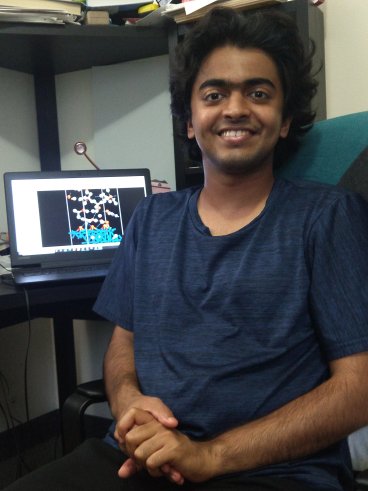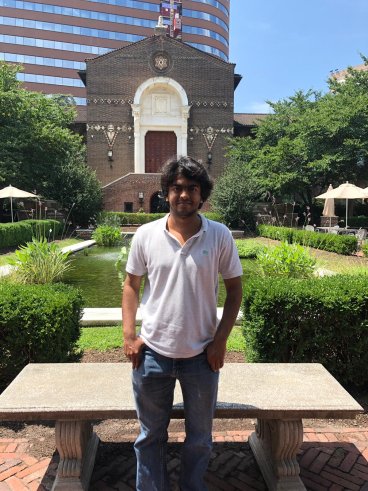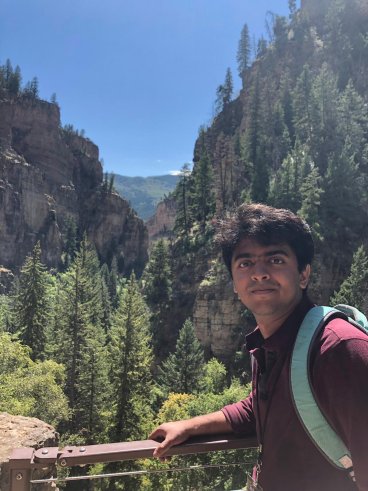Meet CTC: Vineet Maliekkal

August 27, 2020 -- Vineet Maliekkal is a 4th-year graduate student in the Neurock & Dauenhauer groups in the Chemical Engineering Ph.D. program at the University of Minnesota. Vineet graduated from the Indian Institute of Technology-Bombay with a honors Bachelor’s in Technology in Chemical Engineering in 2016. He grew up in New Bombay, India which is a city adjacent to Bombay, where IIT-Bombay is located.
Vineet’s main project is the theoretical investigation of mechanisms and kinetics in cellulose pyrolysis reactions. He has also been working on using density functional theory calculations and ab initio molecular dynamics simulations in an effort to determine the kinetics of these reactions, as well as the role of natural catalytic environments in enhancing the reactivity of cellulose breakdown. Understanding chemistry is critical in developing efficient routes to convert lignocellulosic feedstocks, which are wood-based sources of renewable energy, into fuels and platform chemicals. Platform chemicals are building blocks for day-to-day specialty chemicals, such as pharmaceutical ingredients, and plastics. Specifically, Vineet’s research is useful in building kinetic models, which will help design commercial reactors carrying out cellulose pyrolysis, or the decomposition using high temperatures. It will also provide molecular insights into developing strategies to selectively control product diversification
In addition to this project, he also works on a project investigating the upgrading of biomass oxygenates via hydrogenation over transition metal surfaces using solvent mediation. This chemical process is just one of the processes that platform chemicals must undergo in order to become renewable energy sources. Vineet’s research focuses on determining the molecular role solvents play in enhancing the rates of these reactions. Ultimately, these insights can be used to carry out solvent-engineering and come up with optimal metal-solvent interfaces that can carry out this chemistry efficiently.

Most of Vineet’s research involves density functional theory calculations to investigate the electronic structure of systems of interest. These calculations are done in the Vienna Ab initio Simulation Program (VASP).
Vineet has a passion for playing and watching tennis. He not only enjoys playing tennis in his free time, but he is also “proud of the fact that I have managed to convince many of my friends to learn and play this amazing sport.” He also enjoys reading, particularly biographies of influential people in various fields, such as science & technology, business, and politics.
How did you become interested in studying chemistry, and what gets you the most excited about your field?
I have had a deep interest in mathematics and chemistry since I was young. The process of thinking about various phenomena and solving problems using only a few basic principles and logical thinking made these subjects instant favorites for me. I also spent a good part of my childhood competing in various math and chemistry competitions where I got the chance to learn more about these subjects. I felt like chemical engineering was a natural field for me to get into since it would combine my love for both math and chemistry. The wide range of modern challenges that can be tackled with research in chemistry, particularly in the field of energy and renewable chemicals, is what further attracted me towards chemistry during my undergraduate studies. To this date, the aspect that gets me most excited is that I am still able to use basic scientific principles to not only learn and grasp new concepts but also contribute in a small way to the field of chemistry using my own research findings.
Why did you choose the University of Minnesota, and what led you to join your current research group?
My decision to join the University of Minnesota was primarily driven by the size of the program, its reputation, and the numerous research areas that the department was involved in. In my search for a suitable graduate program, there were few schools that could stand up to the excellent collaborative environment and academia-industry network that the University of Minnesota provided. I always wanted to work on research problems that were applied in nature, but at the same time have an opportunity to use theory and first-principles thinking. The applied and collaborative research in Prof. Neurock’s group matches this description perfectly. The particular project I was offered to work on involves working very closely with experimental researchers in the Dauenhauer group, which is a unique experience for me.
What is your favorite part about living in the Twin Cities?
The four seasons that the Twin Cities has to offer is a clear winner! Coming from a part of the world where the only seasons are warm, hot, and hotter, getting to experience all four seasons and the natural beauty that comes with them is something that I truly find special about this city. The variety of food cuisines that the city has to offer is also really amazing.
What do you enjoy most about your research? What has been your most interesting or surprising finding so far?
The part about my research I enjoy the most is that the projects I get to work in areas where not a lot of theoretical research currently exists, giving me a chance to make novel contributions. The most interesting finding from my work so far has been about the role that vicinal hydroxyl groups, which are naturally present in cellulose, play in enhancing and catalyzing the breakdown of cellulose via unique hydrogen bonding environments. This is a very atypical way for pyrolysis chemistry to occur and it hasn’t been elucidated in great detail before my findings. These observations of unique hydrogen bonding environments enhancing reactivity are increasingly being found in not just other projects I am involved in, but also the work of other research groups. Being able to contribute to a fundamental understanding in a research area that is very much developing right in front of my eyes is extremely rewarding.

What are you most proud of about your academic career so far, and what’s one thing you’d like to achieve in the future?
My academic career so far has given me the opportunity to publish papers and give presentations at prestigious conferences. When I look back at these aspects of my Ph.D., I feel really lucky to have gotten these opportunities. Besides the achievements that can be shown on paper, I am particularly proud of the confidence I have developed in tackling a new research topic, learning about the problem at hand, and being able to contribute towards solving those problems. It is impossible for me to put a value to the problem-solving skills that I have developed. In the future, I would like to take this approach of first-principles thinking and apply it more broadly in areas of applied industrial research. Being able to translate my computational modeling and problem-solving skills into realizable benefits for industrial research teams will be a true validation of my graduate school training.
What drives you to be a better scientist?
I think it is true that technology and science, as well as its impact on society, grows exponentially. While this generally means that every day there are increasingly new frontiers of science being explored, there are also numerous new challenges adding on to the ones that society already faces. I strive to constantly learn more and make myself a better scientist every day so that I not only get the opportunity to continue to be at the forefront of scientific advancement but also so that I can make meaningful contributions to solve some of the biggest challenges we face, such as sustainable production of chemicals and energy sources. My desire to dedicate myself to being a better scientist also stems from the fact that I wish to be a role model to other young aspiring scientists and engineers from my community back in India.
What advice do you have for aspiring scientists?
While having a passion for your field and demonstrating creative thinking and perseverance are critical to being a good scientist, I have found that the best scientists are typically people with a remarkable ability to learn and grasp concepts efficiently. Therefore, my message to aspiring scientists would be to “Learn how to learn”, or in other words, try to work on the approach you take towards learning new topics during your research. Develop a work ethic and mentality that you can follow consistently whenever mastering a new area. This is a skill-set that is extremely valuable and I am still working on imbibing it better in myself.
What are you passionate about?
I am most passionate about using catalysis and reaction engineering to develop innovative solutions to real-world problems. Therefore, I constantly strive to learn more and become better as a researcher. I keep my passion for research ignited by viewing every research problem as a puzzle that needs to be solved by asking the right questions and using the appropriate scientific approach. I truly believe that research in chemistry and chemical engineering is critical to developing solutions to many of the challenges that the world faces today, especially climate change and sustainable development.
